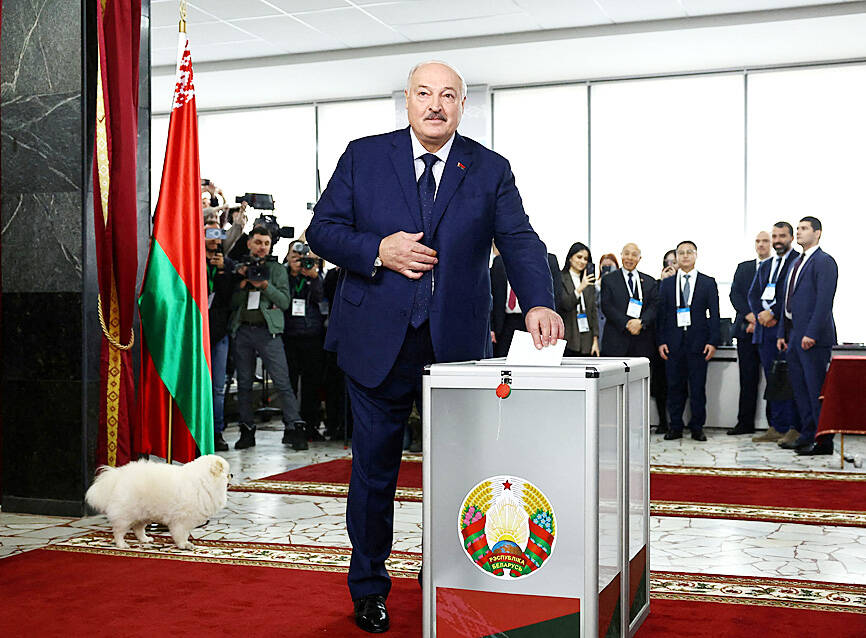Belarusian President Alexander Lukashenko yesterday said that some of his political opponents had “chosen” to go to prison as he cast his vote in an election that was set to extend his 31-year rule.
Lukashenko, 70, held a long news conference during which he was asked how the vote could be free and fair, given that all the main opposition figures are in jail or have fled the country.
“Some chose prison, some chose ‘exile,’ as you say. We didn’t kick anyone out of the country,” he said.

Photo: Reuters
Lukashenko said no one was prevented from speaking out in Belarus, but prison was “for people who opened their mouths too wide, to put it bluntly, those who broke the law.”
The US and the EU both described yesterday’s election as a sham, given the repression of political opponents and the banning of independent media.
“This is a blatant affront to democracy,” EU High Representative for Foreign Affairs and Security Policy Kaja Kallas said on the eve of the vote.
Exiled opposition leader Sviatlana Tsikhanouskaya last week said that Lukashenko was engineering his re-election as part of a “ritual for dictators.”
Lukashenko shrugged off the criticism as meaningless and said it was irrelevant to him whether the West decided to recognize the election or not.
The EU and the US both said they did not recognize him as the legitimate leader of Belarus after he used his security forces to crush mass protests following the previous election in 2020, when Western governments backed Tsikhanouskaya’s claim that he had falsified the results to cheat her of victory.
Tens of thousands of people were arrested. Human rights group Viasna, which is banned as an “extremist” organization, said there are still about 1,250 political prisoners.
Lukashenko said he had freed many people, referring to more than 250 pardons he has issued in the past year.

BUILDUP: US General Dan Caine said Chinese military maneuvers are not routine exercises, but instead are ‘rehearsals for a forced unification’ with Taiwan China poses an increasingly aggressive threat to the US and deterring Beijing is the Pentagon’s top regional priority amid its rapid military buildup and invasion drills near Taiwan, US Secretary of Defense Pete Hegseth said on Tuesday. “Our pacing threat is communist China,” Hegseth told the US House of Representatives Appropriations Subcommittee on Defense during an oversight hearing with US General Dan Caine, chairman of the Joint Chiefs of Staff. “Beijing is preparing for war in the Indo-Pacific as part of its broader strategy to dominate that region and then the world,” Hegseth said, adding that if it succeeds, it could derail

CHIP WAR: The new restrictions are expected to cut off China’s access to Taiwan’s technologies, materials and equipment essential to building AI semiconductors Taiwan has blacklisted Huawei Technologies Co (華為) and Semiconductor Manufacturing International Corp (SMIC, 中芯), dealing another major blow to the two companies spearheading China’s efforts to develop cutting-edge artificial intelligence (AI) chip technologies. The Ministry of Economic Affairs’ International Trade Administration has included Huawei, SMIC and several of their subsidiaries in an update of its so-called strategic high-tech commodities entity list, the latest version on its Web site showed on Saturday. It did not publicly announce the change. Other entities on the list include organizations such as the Taliban and al-Qaeda, as well as companies in China, Iran and elsewhere. Local companies need

CROSS-STRAIT: The MAC said it barred the Chinese officials from attending an event, because they failed to provide guarantees that Taiwan would be treated with respect The Mainland Affairs Council (MAC) on Friday night defended its decision to bar Chinese officials and tourism representatives from attending a tourism event in Taipei next month, citing the unsafe conditions for Taiwanese in China. The Taipei International Summer Travel Expo, organized by the Taiwan Tourism Exchange Association, is to run from July 18 to 21. China’s Taiwan Affairs Office spokeswoman Zhu Fenglian (朱鳳蓮) on Friday said that representatives from China’s travel industry were excluded from the expo. The Democratic Progressive Party government is obstructing cross-strait tourism exchange in a vain attempt to ignore the mainstream support for peaceful development

ELITE UNIT: President William Lai yesterday praised the National Police Agency’s Special Operations Group after watching it go through assault training and hostage rescue drills The US Navy regularly conducts global war games to develop deterrence strategies against a potential Chinese invasion of Taiwan, aimed at making the nation “a very difficult target to take,” US Acting Chief of Naval Operations James Kilby said on Wednesday. Testifying before the US House of Representatives Armed Services Committee, Kilby said the navy has studied the issue extensively, including routine simulations at the Naval War College. The navy is focused on five key areas: long-range strike capabilities; countering China’s command, control, communications, computers, cyber, intelligence, surveillance, reconnaissance and targeting; terminal ship defense; contested logistics; and nontraditional maritime denial tactics, Kilby